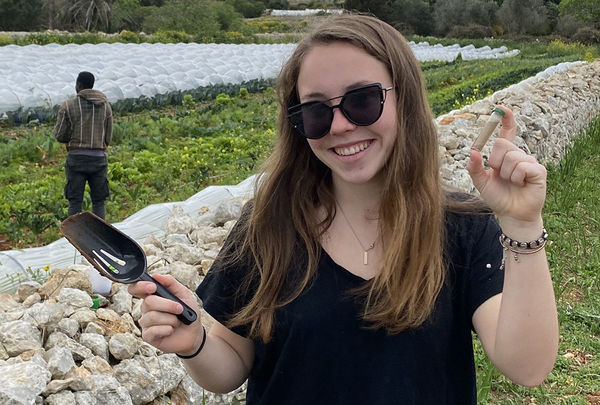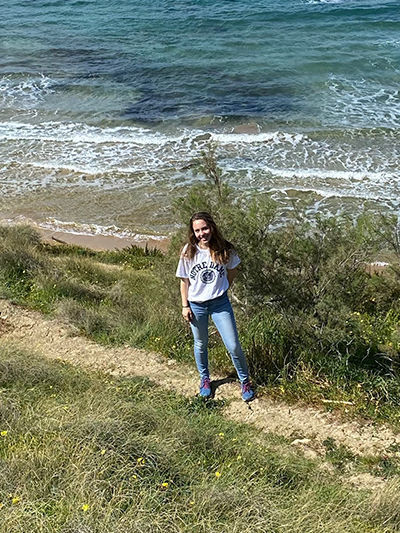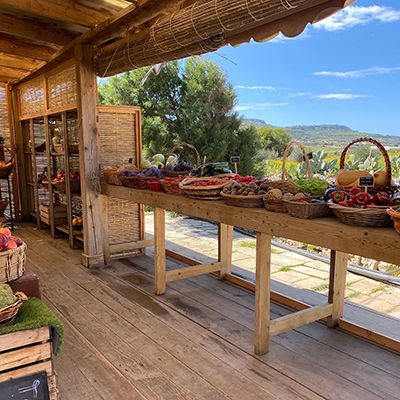
Inspired by water conservation initiatives from around the world, Lyla Senn ’23, a chemical engineering major at the University of Notre Dame, traveled to the Maltese countryside with funding from a Nanovic Institute Spring Break Travel and Research Grant to study water recycling options that may aid Malta's growing water crisis.
This article is the first in a series of blog posts published by the Nanovic Institute for European Studies. The Nanovic Navigator is home to stories told by our students about their unique experiences in Europe through our undergraduate grant programs. If you have questions about a story, a student, or the Nanovic Institute, please contact Anna Dolezal, student programs assistant manager (adolezal@nd.edu).

Is recycled (or reclaimed) water sustainable for Maltese farming? I sought to answer this question by analyzing soil samples at two different farms: one that used reclaimed water, and one that used freshwater. If the soil nutrient levels were similar and farmers decided crop yield was productive, it is logical to assume that recycled water could safely be used as an alternative for freshwater.
I became interested in water usage after taking a course entitled “Human Impacts and the Environment,” which taught me about anthropogenic climate change and opened my eyes to avenues where humans can adapt to preserve limited resources. After preliminary research, I quickly became interested in Malta's water crisis. I wanted to explore ways to alleviate future burdens, targeting the agriculture sector, which accounts for 70-90% of global freshwater usage. Malta does not have rivers or lakes and relies on desalination and groundwater to supply their drinking and freshwater needs, and farms—such as Vincent's Eco Estate—have begun to use reclaimed water in an attempt to conserve freshwater.
Upon arriving in Malta, my project quickly shifted. After an informal conversation with the main farmer on Vincent’s Eco Estate, I quickly learned (and had assumed) that Malta’s water crisis is more severe than people acknowledge, specifically for agriculture. The Estate answered my original question and confirmed that reclaimed water is, in fact, a suitable alternative for freshwater. Their crop production, however, has been altered and diminished because of drought.
Ultimately, the main issue is the quantity, not quality, of recycled water available on the island.
Vincent’s Eco Estate uses three water sources: rainwater (which they get very little of), underground water (which is brackish and detrimental to crops), and reclaimed water (which is very expensive to transport). After learning that reclaimed water is a suitable alternative for freshwater, I adjusted my research to focus on soil analysis. In the past three to four years, the Estate has seen their wheat (the farm's main crop) and chardonnay crops fail, forcing them to plant rapeseed and Maltese grapes in their place. The main issue in switching crops is that the new grape takes four years to develop before producing usable fruit.

The soil on the Estate had a relatively consistent healthy pH (6.0 to 7.0), a surplus of phosphorus, and depleted nitrogen and potash stores. Although rare, it rained during the week I was there. Yet, the rain did not alter nutrient levels. Like my home state of Texas, farmers in the area implement dry-land farming techniques including terracing, dry-land crops, crop and plot rotation, and planting crops close together to maximize the spread of water. The Maltese farms rely on the small bits of rain they get, though it is not enough to sustain previous crop yields.
While challenging to deviate from my proposed plan, I was able to adapt and answer the new questions I had. Then, very suddenly, my time in Malta shifted from soil research to wondering if I could leave the beautiful country or what the rest of my time there would look like due to COVID-19 (i.e. quarantine, closing restaurants, etc.). After travel ban announcements, increased positive cases, and quarantine notifications, I was unsure of what to do. Thankfully, this experience taught me how to stay calm amidst a global crisis, how to communicate effectively with people back home and airline representatives, and quickly adapt to changing announcements and plans.
The people of Malta are kind and welcoming. Despite coming from all over the globe, almost all of Malta's citizens know English. I loved the conversations I had with people because of a shared language, love of food, and general concern about what was happening in the world around us. At the start of the pandemic, Malta responded with charity and consideration for at-risk members of their communities while also trying to respond quickly and effectively to contain the virus.
This was truly an unforgettable experience. Not only did I enjoy my time in Malta, learning about soil and the deep history and melting pot of culture on a small island, but I will never forget traveling from Europe during the COVID-19 outbreak.